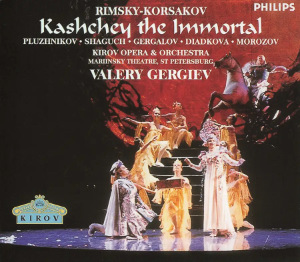
Nikolai Rimsky-Korsakov (1844-1908)
Kashchey the Immortal (Kashchei Bessmyertnyi) (1902)
Kashchey – Konstantin Pluzhnikov (tenor),
Princess – Marina Shaguch (sopranos),
Kaschcheyevna – Larissa Diadkova (mezzo)
Prince Ivan Korolevich – Alexander Gergalov (baritone)
Storm Knight – Alexander Morozov (bass)
Kirov Opera and Orchestra of the Mariinsky Theatre/Valery Gergiev
rec. 1995, Large Hall of the St Petersburg Philharmonic, Russia
Philips 4467042 [63]
Kashchey the Immortal (also sometimes spelled as Kashehey, as it is on this release) is one of Rimsky-Korsakov’s late career operas. He would go on to compose three further operas before his death in 1908. As such, it shows the composer in full command of his inspiration, and in particular demonstrates his gift for orchestrating with a variety of colours and moods. As it is a short work, lasting just over an hour, it could easily be paired with another one-act opera such as La vida breve, Bluebeard’s Castle, or even L’enfant et les sortilèges for an interesting double bill. Unfortunately, it has been rarely staged in the West and even in its native Russia it is not a frequent visitor.
Valery Gergiev brought the work back into the repertoire of the Mariinsky Theatre as part of his ongoing quest to renew the important works of Russian opera during the 1990s. This recording was made concurrently with a production by the Kirov Company that travelled around the world at the time.
The main flaw in this opera is that the characters are mostly stock figures of legend and lack any real dimensionality. The exception to this is the character of Kaschcheyevna, the daughter of the wizard. Just like Amneris in Verdi’s Aida, Kaschcheyevna is a fully fleshed-out character who immediately gains the interest and sympathy of the audience in a way that the imprisoned Princess cannot. On this recording, Kaschcheyevna is sung by the golden-voiced Larissa Diadkova. She is everything one could wish for and more. Her voice has a sharply disciplined tone that is also quite sensual to experience. Her vocal production is absolutely solid in all registers, making listening to her lengthy aria the chief highlight of this recording.
The much-put-upon Princess is given a straightforward interpretation by Marina Shaguch. Her soprano is bright-toned and clear in that slightly piercing way that is so common among Slavic spinto sopranos. Crucially, she never shows the slightest sign of a wobble, so her contribution is definitely on the plus side of things.
The title role is sung by Konstantin Pluzhnikov. Kashchey is a role composed for a very high-lying character tenor. Pluzhnikov works hard but he rarely sounds sufficiently menacing, as opposed to just grumpy and out of sorts. Neither does his voice register very sweetly although as the villain it probably isn’t supposed to. Pavel Pontryagin manages to sound far more threateningly evil on the old Samosud recording from 1949 (review).
Alexander Gergalov’s Ivan does not really convey the impression of a heroic Prince although his gentle, soft-grained baritone is quite lovely as far as singing goes. Still if one listens to the great Pavel Lisitsian on the Samosud recording it reveals that there is definitely more to this character, and Lisitsian’s tone is, if anything, even more ravishing than Gergalov’s.
Alexander Morozov gives a solid straightforward interpretation of the enslaved Storm Knight. His firm, bass-baritone sound is most welcome here.
Valery Gergiev and the forces of the Mariinsky play the score with all of their usual polish and professionalism although this is not music which allows Gergiev to individualize his interpretation to any significant degree. In comparison, the really excellent Samuil Samosud does manage to inject more general anxiety into the first half of the opera than Gergiev and often projects a greater feeling of urgency about this wonderful score. This could be in part due to the rather close sound field of the 1949 recording. The Kirov recording has the voices fairly clear and forward with the orchestra and chorus somewhat too much recessed than would be my ideal preference. There has been at least one other recording of this opera from the stereo era which I have yet to hear (Brilliant Classics 94657). Certainly Gergiev’s recording is very good if not quite reaching the level of the earlier Samosud recording. That one is in old mono; therefore, the Gergiev will more than do if one wants to experience this opera in modern stereo.
Mike Parr
Buying this recording via a link below generates revenue for MWI, which helps the site remain free



















